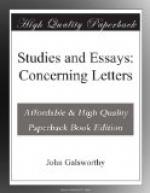as this power to see whether it be the beautiful or
the foul that is disclosed? Need I, indeed, tell
you of the way this flame spreads its feelers, and
delicately darts and hovers in the darkness, conjuring
things from nothing? This mechanical summoning,
Sirs, of visions out of blackness is benign, by no
means of malevolent intent; no more than if a man,
passing two donkeys in the road, one lean and the
other fat, could justly be arraigned for malignancy
because they were not both fat. This, reverend
Judges, is the essence of the matter concerning the
rich burgess, Pranzo, who, on account of the sight
he saw by Cethru’s lanthorn, has lost the equilibrium
of his stomach. For, Sirs, the lanthorn did but
show that which was there, both fair and foul, no
more, no less; and though it is indeed true that Pranzo
is upset, it was not because the lanthorn maliciously
produced distorted images, but merely caused to be
seen, in due proportions, things which Pranzo had not
seen before. And surely, reverend Judges, being
just men, you would not have this lanthorn turn its
light away from what is ragged and ugly because there
are also fair things on which its light may fall; how,
indeed, being a lanthorn, could it, if it would?
And I would have you note this, Sirs, that by this
impartial discovery of the proportions of one thing
to another, this lanthorn must indeed perpetually seem
to cloud and sadden those things which are fair, because
of the deep instincts of harmony and justice planted
in the human breast. However unfair and cruel,
then, this lanthorn may seem to those who, deficient
in these instincts, desire all their lives to see
naught but what is pleasant, lest they, like Pranzo,
should lose their appetites—it is not consonant
with equity that this lanthorn should, even if it could,
be prevented from thus mechanically buffeting the
holiday cheek of life. I would think, Sirs,
that you should rather blame the queazy state of Pranzo’s
stomach. The old man has said that he cannot
help what his lanthorn sees. This is a just
saying. But if, reverend Judges, you deem this
equipoised, indifferent lanthorn to be indeed blameworthy
for having shown in the same moment, side by side,
the skull and the fair face, the burdock and the tiger-lily,
the butterfly and toad, then, most reverend Judges,
punish it, but do not punish this old man, for he himself
is but a flume of smoke, thistle down dispersed—nothing!”
So saying, the young advocate ceased.
Again the three Judges took counsel of each other, and after much talk had passed between them, the oldest spoke:
“What this young advocate has said seems to us to be the truth. We cannot punish a lanthorn. Let the old man go!”
And Cethru went out into the sunshine . . . .
Now it came to pass that the Prince of Felicitas, returning from his journey, rode once more on his amber-coloured steed down the Vita Publica.
The night was dark as a rook’s wing, but far away down the street burned a little light, like a red star truant from heaven. The Prince riding by descried it for a lanthorn, with an old man sleeping beside it.




